#henry giroux
Explore tagged Tumblr posts
Text

henry giroux, in an interview with cccb lab
#always coming back to tht interview it literally changed my life#and i love this quote sm#henry giroux#.txt
7 notes
·
View notes
Link
2 notes
·
View notes
Text
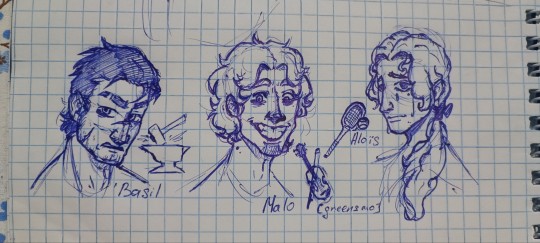

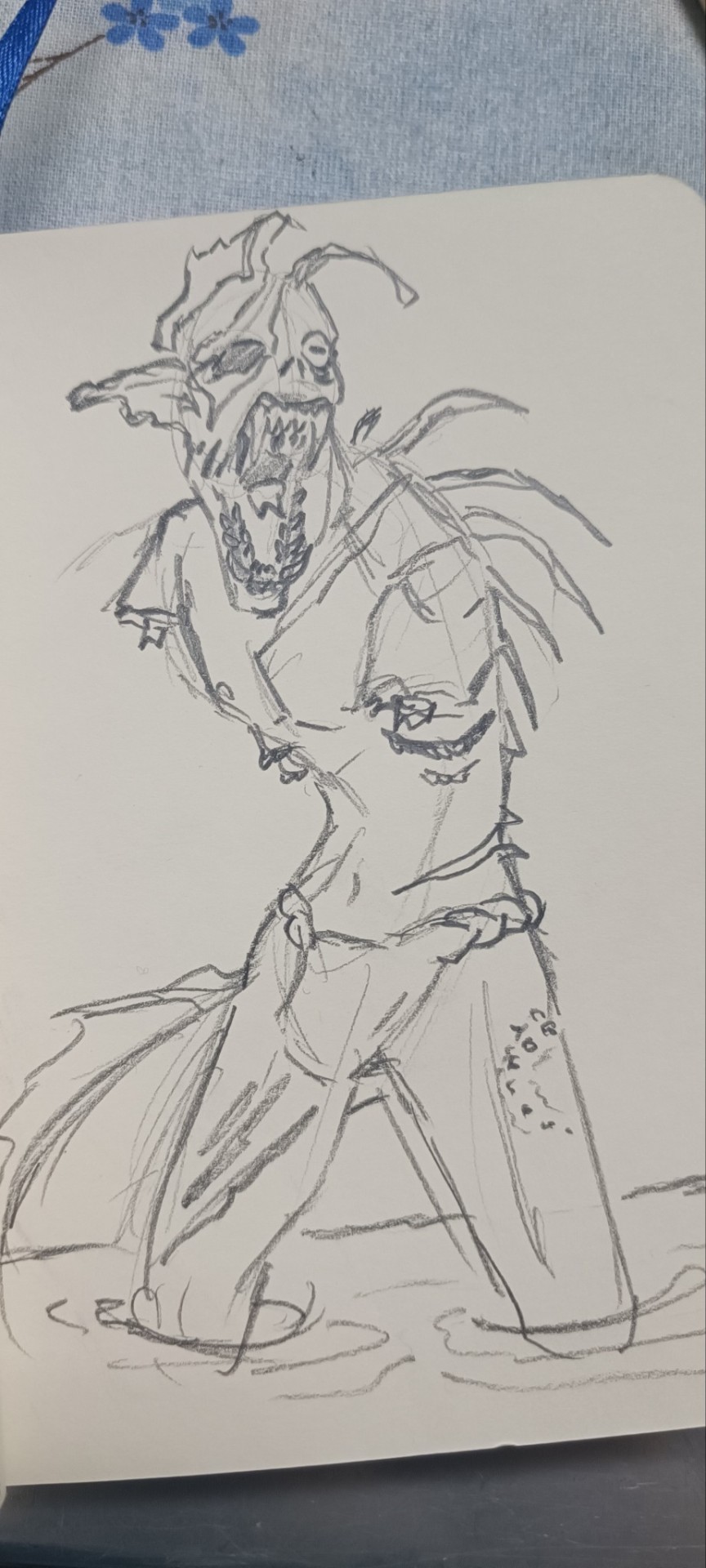
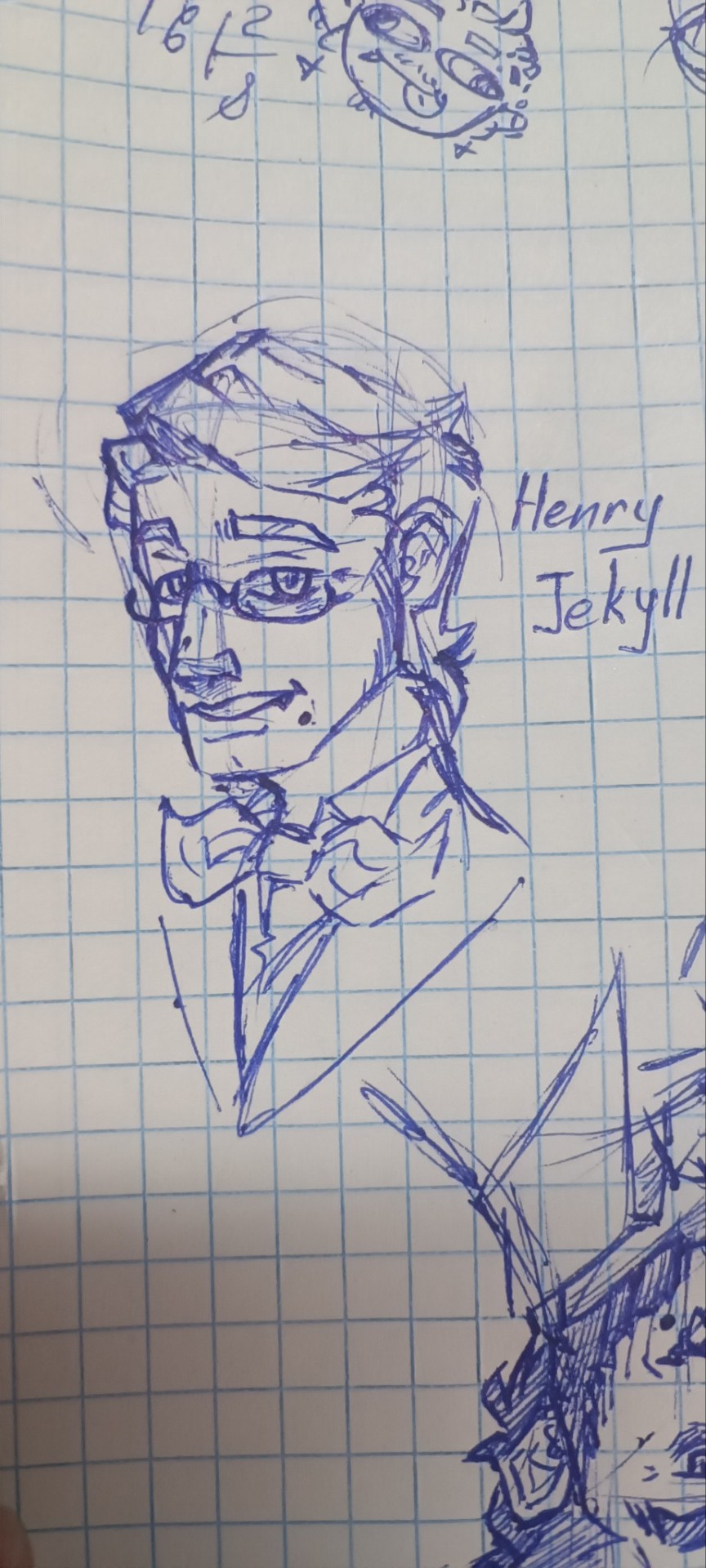
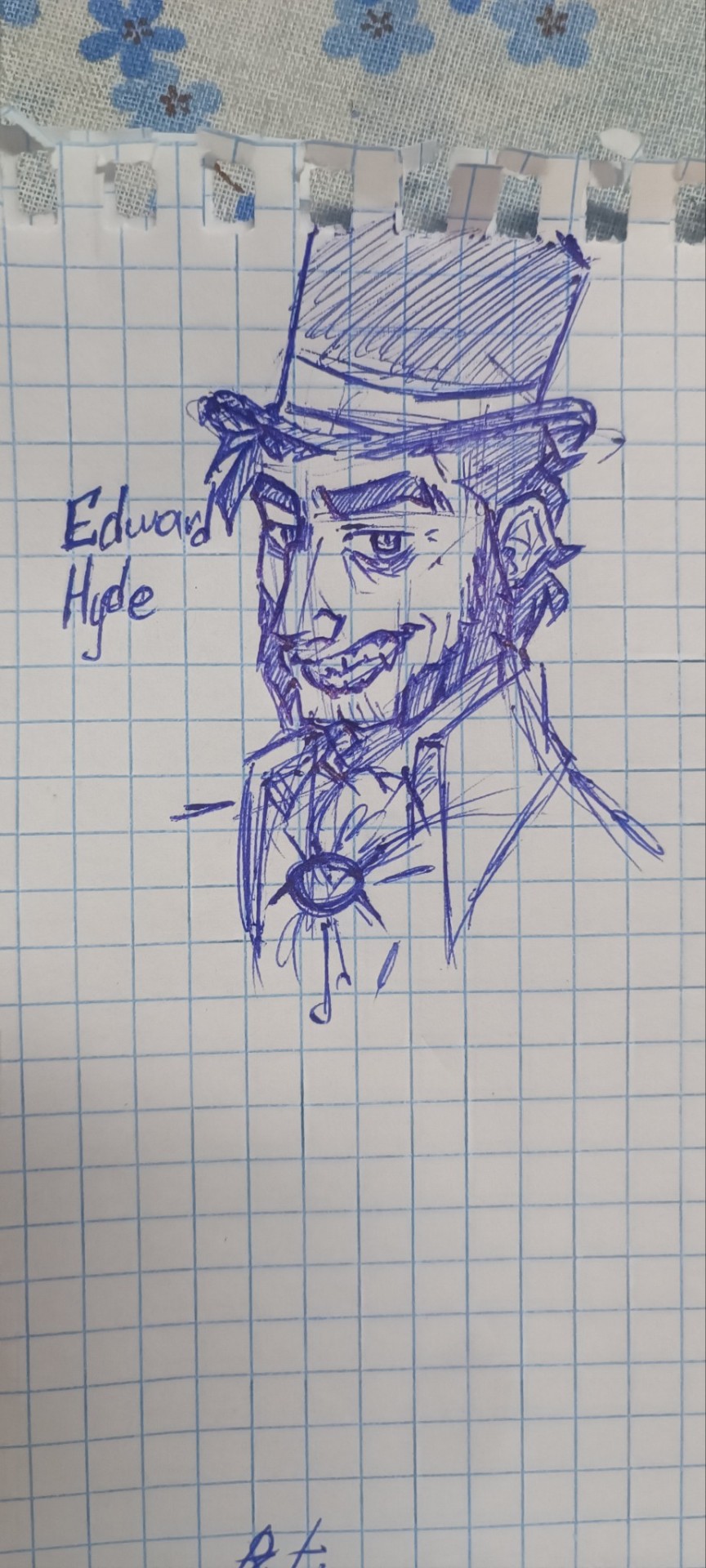
Well it's been a while! Got a bunch of sketches for ya)
2-3 are The Shadow and Kaernk human verses
#my art#sketch#amnesia#amnesia the dark descent#amnesia justine#Aloïs Racine#Basile Giroux#Malo De Vigny#The shadow#Kaernk#the strange case of dr jekyll and mr hyde#henry jekyll#edward hyde
53 notes
·
View notes
Text
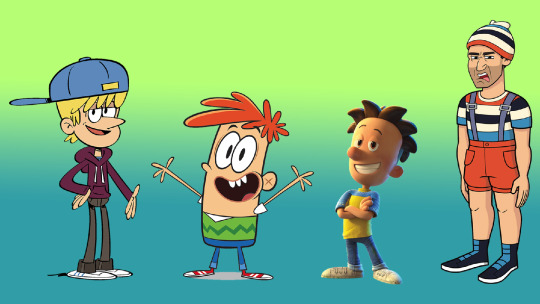
#happy birthday#ben giroux#nickelodeon#nicktoons#big nate#nate wright#the loud house#cooked#bunsen is a beast#mikey munroe#henry danger#danger force#the adventures of kid danger and captain man#the adventures of kid danger#adventures of kid danger#the toddler
16 notes
·
View notes
Text
but what did i expect from the university that is pushing a construction project on top of unmarked graves of indigenous peoples forced into mk ultra experiments while screaming on all social media platforms that they support indigenous peoples
4 notes
·
View notes
Text
Yeah so we are so used to be queerbaited that we have to fill in some gaps and the LJ ship manifesto was a fun practice of connecting dots and pointing out sparks and showing why the ship was logical. And people could just choose their own adventure -- like "Oh, it has to be Kirk/Spock" but then someone else thinks McCoy needs to be part of the thing, either with one or the other or as a trio.... so people got used to just shipping whatever they wanted because it was never going to happen on screen.
And here comes OFMD with "guess what, we'll take the glass away! (n. Henry Giroux ref) so we have this great relationship.
But people are still in the habit of choosing their own ship...which, in this particular show when Izzy (shit, he is no Bones McCoy, senator) is the apparently obvious third, has a racist and pro-abuse impact that is very hard to take.
Unless you just think "anything goes, it's fandom, no judging here."
But with a smart show-runner and genius writing and an on-screen romance that is just gorgeous and fucking innovative (i guess? haven't though enough about that), some things just shouldn't go. They should NOT go.
Ship Manifestos?
Do any of my fellow OFMD fans who are also Livejournal veterans remember how common ship manifestos used to be? I'm not saying they were exclusive to LJ, just that I tended to see them more commonly there, and as a discrete thing from the way general meta seems to take shape on tumblr dot com. Which is fine! The medium is the message etc, but I just started thinking about how I never see them anymore.
I think I'm thinking about this because more than in any other fandom I've ever participated in, I find myself baffled by A Few Particular non-canon ships in a way I can't possibly account for. Even with the requisite probable lack of hinges, I find myself missing the ship manifesto as a form in this situation. It's making me feel old and nostalgic and also like, fundamentally divorced from the way my brain used to handle even those ships that weren't for me.
Beyond the obvious internal fandom discourse we've had at length (and don't need to rehash) about the ways shipping does and does not feel different with ofmd, I wonder if this is more of that "we're so used to queer romance as subtext or afterthought that we handle queer-centric stories strangely" phenomenon?
35 notes
·
View notes
Text


Ben Giroux[1] and Tommy Walker[2] on NCIS
[1] Charade , S13 E20 , as Tiny Tony
[2] Silent Service , S16 E17 , as PO 1st Class Justin Hardy
11 notes
·
View notes
Text

Henry's Fate & Other Poems, 1967-1972 (1977)
John Berryman
Farrar, Straus & Giroux
1 note
·
View note
Text
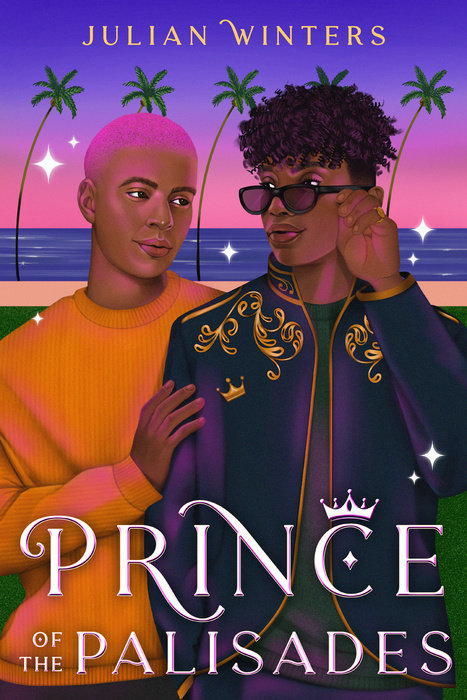
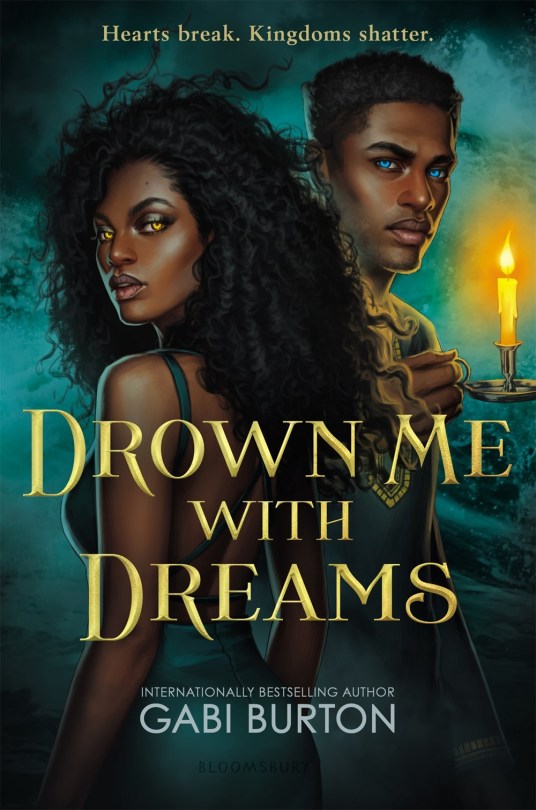
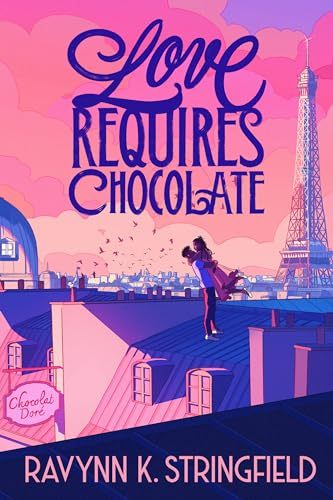
New Releases
A whole slew of new books coming out this week and I see some I want to add to my TBR pile. How about you?
Something Like Right by H. D. Hunter Farrar, Straus and Giroux (BYR)
A contemporary young adult novel about one life-altering year of a biracial Black and white teen boy, showing a raw glimpse into the systemic inequality in racialized communities.
Zay’s ma always said his mouth would get him in trouble. Sure enough, it got him into his first and only fight in his junior year of high school. Expelled from his district, Zay’s only hope for redemption is to transfer to Broadlawn Alternative School and complete the year.
Zay isn’t thrilled about the disgusting school lunch and classroom trailers at Broadlawn, and boarding with his aunt Mel and her live-in boyfriend isn’t the greatest. But he’d rather be there than in the city dealing with his estranged father, his overbearing mother, and the fallout from his fight. Besides, Broadlawn has Feven, the beautiful new student Zay is starting to get to know—and fall for.
Still, first love is rarely a fairy tale, and as Zay’s time in Broadlawn comes to an end, he learns that shaping yourself within a new place is a lot harder than letting it shape you.
A tender contemplation of first love, broken families, and healing generational trauma by an incredible voice in young adult fiction.
Drown Me with Dreams (Sing Me to Sleep #2) by Gabi Burton Bloomsbury YA
In the second book in this dark and seductive YA fantasy duology, a siren must decide if saving her kingdom is worth betraying the boy she loves.
Saoirse Sorkova is on the run. Accused of several murders, her siren identity compromised, even the newly crowned King Hayes can’t protect her if she’s caught. The only way to save her life is to send her on a dangerous mission across the magical barrier that surrounds the kingdom.
Forced to travel with Carrick – once her best friend, now her greatest betrayer – she begins to unravel multiple plots that threaten the safety of her family, the livelihood of the entire kingdom, and her future with Hayes. And the more time she spends with Carrick, the harder it is to keep hating him . . .
Soon, Saoirse is forced to what if Hayes isn’t the right ruler for the kingdom? And if he’s not, is she willing to betray her king – and her heart?
Featuring an all Black and Brown cast, a forbidden romance, and a compulsively dark plot full of twists, this thrilling YA fantasy series is perfect for fans of A Song Below Water and To Kill a Kingdom.
Prince of the Palisades by Julian Winters Viking Books for Young Readers
Young Royals meets Red, White, and Royal Blue in this heart-pumping romance by award-winning author Julian Winters!
When roguish Prince Jadon of Îles de la Rêverie is left in America to clean up his image after a horribly public break-up gone viral, romance is not on the table. Carefully planned photo ops with puppies? Yes. Scheduled appearances with the Santa Monica elite Absolutely. Rendezvous with a pink-haired, film-obsessed hottie from the private school where he’s currently enrolled? Uhhhh . . .
Together with his entourage—a bitingly witty royal guard, Rêverie’s future queen (and Jadon’s brilliant older sister), and a quirky royal liaison—Jadon’s on a mission to turn things around and show his parents, and his country, that he’s more than just a royal screw-up. If he doesn’t prove that he’s the prince Rêverie deserves? Well, he may not be allowed home . . .
But falling for a not-so-royal American boy has Jadon redefining what it means to be a leader. If he can be someone’s Prince Charming just by being himself, maybe that’s all it takes to win over a nation. Or at least a prince can dream .
A Bánh Mì for Two by Trinity Nguyen Henry Holt and Co. BYR Paperbacks
In this sweet sapphic romance about two foodies in love, Vivi meets Lan while studying abroad in Vietnam and they spend the semester unraveling their families’ histories—and eating all the street food in Sài Gòn.
In Sài Gòn, Lan is always trying to be the perfect daughter, dependable and willing to care for her widowed mother and their bánh mì stall. Her secret passion, however, is A Bánh Mì for Two, the food blog she started with her father but has stopped updating since his passing.
Meanwhile, Vietnamese American Vivi Huynh, has never been to Việt Nam. Her parents rarely talk about the homeland that clearly haunts them. So Vivi secretly goes to Vietnam for a study abroad program her freshman year of college. She’s determined to figure out why her parents left, and to try everything she’s seen on her favorite food blog, A Bánh Mì for Two.
When Vivi and Lan meet in Sài Gòn, they strike a deal. Lan will show Vivi around the city, helping her piece together her mother’s story through crumbling photographs and old memories. Vivi will help Lan start writing again so she can enter a food blogging contest. And slowly, as they explore the city and their pasts, Vivi and Lan fall in love.
Codex Black (Book Two): Bird of Ill Omen by Camilo Moncada Lozano IDW Publishing
Best friends Donají and Itzcacalotl stumble into dangerous political intrigue in this follow-up to the young adult epic Codex Black: A Fire Among Clouds!
In 15th-century Mesoamerica, Donají and Itzcacalotl travel to the Oracle of Lyobaa in the hopes of learning the secret behind Donají’s missing father. But instead of receiving information, they find themselves roped into a quest to stop the assassination of the great Emperor Ahuizotl! This is easier said than done when faced with a mysterious group of black-clad killers who want nothing more than to send the known world tumbling into chaos.
Along the way, the two will have to navigate new friends, old enemies, and corn people as they try to save the emperor…before it’s too late!
Helga by Catherine Yu Page Street YA
Helga is not the obedient science experiment her father intended. And though she has only just awoken, he leaves her in the care of his lab assistant Penny to go on a business trip.
Bursting with curiosity, Helga quickly escapes from the well-meaning Penny and heads into Amaris City. There Helga finds she is as untamable as the invasive blackberry vines overtaking the island. And because of the misdeeds of her father’s scientific community, the natural world grows more volatile.
Helga soon discovers the night market, rowdy clubs, delicious food, and cute boys. Enamored with city life, she’ll do anything to find love―but she has only two weeks until her father gets back, and besides there are ominous rumblings from the volcanic island that could put her dating schemes, and even her own life, in grave peril.
We Are the Medicine (Surviving the City #3) written by Tasha Spillett & illustrated by Natasha Donovan HighWater Press
Miikwan and Dez are in their final year of high school. Poised at the edge of the rest of their lives, they have a lot to decide on. Miikwan and her boyfriend, Riel, are preparing for university, but Dez isn’t sure if that’s what they want for their future.
Grief and anger take precedence over their plans after the remains of 215 children are found at a former residential school in British Columbia. The teens struggle with feelings of helplessness in the face of injustice. Can they find the strength to channel their frustration into action towards a more hopeful future?
“We Are the Medicine” is the moving final volume of the best-selling Surviving the City series.
Love Requires Chocolate by Ravynn K. Stringfield Joy Revolution
Whitney Curry is primed to have an epic semester abroad. She’s created the perfectitinerary and many, many to-do lists after collecting every detail possible about Paris, France. Thus, she anticipates a grand adventure filled with vintage boutiques, her idol Josephine Baker’s old stomping grounds, and endless plays sure to inspire the ones she writes and—ahem—directs!
But all is not as she imagined when she’s dropped off at her prestigious new Parisian lycée. A fish out of water, Whitney struggles to juggle schoolwork, homesickness, and mastering the French language. Luckily, she lives for the drama. Literally.
Cue French tutor Thierry Magnon, a grumpy yet très handsome soccer star, who’s determined to show Whitney the real Paris. Is this type-A theater nerd ready to see how lessons on the City of Lights can turn into lessons on love?
13 notes
·
View notes
Text
find a blorbo!: a tag game for the new NHL season
Thanks for the tag @mikathemad
RULES: Go through the roster of each NHL team and find at least one player that you can root for.
Yes, even the team you despise. Yes, even the team everyone despises. Yes, even the team who you dare not speak of.
(I used a different colour for teams I actually root for. or. where I'd be pretty happy should they win.)
Anaheim Ducks - Lukas Dostal
Boston Bruins - David Pastrnak, Jeremy Swayman, Joonas Korpisalo, maybe even Fabian Lysell for inside joke reasons
Buffalo Sabres - JJ Peterka, Devon Levi, Ukko-Pekka Luukkonen, Bowem Byram, Henri Jokiharju, Rasmus Dahlin
Calgary Flames - Yegor Sharangovich, Jonathan Huberdeau
Carolina Hurricanes - Tyson Jost, Sebastian Aho, Jesperi Kotkaniemi, Frederik Andersen, Pyotr Kochetkov, Brent Burns, Andrei Svechnikov
Chicago Hockey Team - Teuvo Teräväinen, Lukas Reichel
Colorado Avalanche - Mikko Rantanen, Erik Brännström,Gabriel Landeskog, Aleksander Georgiev, Justus Annunen, Samuel Girard, Cale Makar, Artturi Lehkonen, Joel Kiviranta
Columbus Blue Jackets - Elvis Merzlikins, Mikael Pyyhtiä, should they call him up again. I mean. As of right now, he's still in their trainings camp roster, so maybe~
Dallas Stars - Jason Robertson, Magnus Hellberg, Jake Oettinger, Esa Lindell, Miro Heiskanen, Roope Hintz,
Detroit Red Wings - J.T. Compher, Moritz Seider, Alex Lyon, Ville Husso, Eemil Viro should they ever call him up.
Edmonton Oilers - Leon Draisaitl, Jeff Skinner
Florida Panthers - Niko Mikkola, Aleksander Barkov, Eetu Luostarinen, Anton Lundell, Matthew Tkachuk
Los Angeles Kings - Darcy Kuemper
Minnesota Wild - Marc-André Fleury, Joel Eriksson Ek, Kirill Kaprizov, Mats Zuccarello
Montreal Canadiens - Oliver Kapanen (If he doesn't go back to Timrå IK after trainings camp), Juraj Slafkovsky, Arber Xhekaj, Joel Armia, Alex Newhook, Patrik Laine
Nashville Predators - Juuso Pärssinen! Juuse Saaros, Roman Josi, Brady Skej
New Jersey Devils - Dougie Hamilton
New York Islanders - Mathew Barzal, Bo Horvat
New York Rangers - Mika Zibanejad, Kaapo Kakko, Igor Shestorkin
Ottawa Senators - Tim Stützle, Linus Ullmark, Claude Giroux,
Philadelphia Flyers - Travis Konecny, Erik Johnson
Pittsburgh Penguins - Jesse Puljujärvi, (the rest of them too)
San Jose Sharks - Nico Sturm, Yaroslav Askarov, Mario Ferraro, Valtteri Pulli should he get called up
Seattle Kraken - Philipp Grubauer, André Burakovsky, Eeli Tolvanen,
St. Louis Blues - Kasperi Kapanen, Mathieu Joseph, P.O. Joseph, Alexandre Texier WHAT ARE YOU DOING THERE, WHEN DID THIS HAPPEN???
Tampa Bay Lightning - Jake Guentzel, Connor Sheary
Toronto Maple Leafs - William Nylander, Joseph Woll, Matthew Knies, John Tavares, Oliver Ekman Larsson, Jani Hakanpää, Morgan Rielly
Utah Hockey Club - Juuso Välimäki, Matias Maccelli
Vancouver Canucks - Quinn Hughes, Elias Petterson
Vegas Golden Knights - Noah Hanifin, Tomas Hertl
Washington Capitals - Pierre-Luc Dubois, Nicklas Bäckström?
Winnipeg Jets - Kaapo Kähkönen, Nikolaj Ehlers
Can't really think of anyone to tag right now (sorry friends, illness!brain go blank) but if you see this and wanna take part, please do!
#tag game#thanks for the tag!#this was fun but also tedious and i learned things (aka Tex got traded) that i didn't know before
5 notes
·
View notes
Text

from henry giroux's newest article in counterpunch, "poisoning the american mind: student protests in the age of the new mccarthyism"
7 notes
·
View notes
Text
#thewaronyou
1 note
·
View note
Text
By: James Lindsay
Published: May 14, 2024
There's a right name for the "Woke" ideology, and it's critical constructivism. Critical constructivist ideology is what you "wake up" to when you go Woke. Reading this book, which originally codified it in 2005, is like reading a confession of Woke ideology. Let's talk about it.
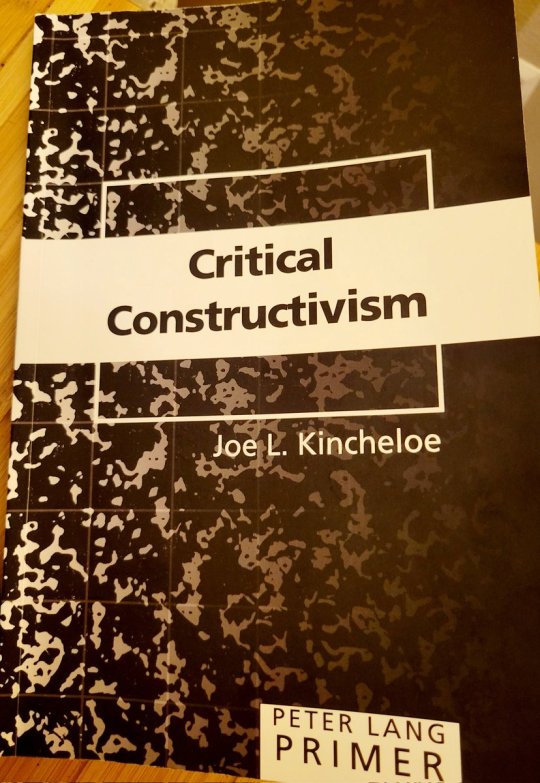
The guy whose name is on the cover of that book is credited with codifying critical constructivism, or as it would be better to call it, critical constructivist ideology (or ideologies). His name is Joe Kincheloe, he was at Magill University, and he was a critical pedagogue.
Just to remind you, critical pedagogy is a form of brainwashing posing as education that is the application of critical theory to educational theory and praxis as well as teaching and practice of critical theories in schools. It comes from Paulo Freire.
It's not the right thread to outline Paulo Freire or critical pedagogy, but the short summary is that critical pedagogy was developed from Freire's method of "education," which is to use educational materials as a "mediator to political knowledge," i.e., excuse to brainwash.
The point of critical pedagogy is to use education as a means not to educated but to raise a critical consciousness in students instead. That is, its purpose is to make them "Woke." What does that entail, though? It means becoming a critical constructivist, as Kincheloe details.
Note what we've already said, though. Yes, Marcuse. Yes, intersectionality. Yes, CRT and Queer Theory et cetera. Yes, yes, yes. That's Woke, BUT Woke was born and bred in education schools. I first recognized this right after we published Cynical Theories in 2020.
Critical pedagogy, following people like Henry Giroux and Joe Kincheloe, forged together the religious liberationist Marxism of Freire, literally a Liberation Theologian, with the "European theorists," including both Critical Marxists like Marcuse and postmodernists like Foucault
In other words, when @jordanbpeterson identified what we now call "Woke" as "postmodern neo-Marxism," he was exactly right. It was neo-Marxist critique that had taken a postmodern turn away from realism and reality. The right name for that is "critical constructivism."
Critical constructivism contains (or synthesizes) two disparate parts: "critical," which refers to Critical Theory (that is, neo-Marxism or Critical Marxism), and "constructivism," which refers to the constructivist thinking at the heart of postmodernism and poststructuralism.
Critical Theory we all already generally understand at this point. The idea is pretty simple: ruthless criticism of everything that exists; calling everything you want to control "oppression" until you control it; finding a new proletariat in "ghetto populations"; blah blah blah.
More accurately, Critical Theory means believing the world and the people in it are contoured by systems of social, cultural, and economic power that are effectively inescapable and all serve to reproduce the "existing society" (status quo) and its capitalist engine.
Critical Theory is not concerned with the operation of the world, "epistemic adequacy" (knowing what you're talking about), or anything else. They're interested in how systemic power shapes and contours all things and how they're experienced and gives (neo)-Marxist critique.
Constructivism is a bit less familiar for two reasons: 1) We've done a lot of explaining and criticizing Critical Theory already, so people are catching on, and 2) It's a downright alien intellectual landscape that is almost impossible to believe anyone actually believes.
You're already very familiar with the language of constructivism: "X is a social construct." Constructivism fundamentally believes that *the world* is socially constructed. That's a profound claim. So are *people* as part of the world. That's another profound claim. So is power.
I need you to stop thinking you get it and listen now because you're probably already rejecting the idea that anyone can be a constructivist who believes the world is itself socially constructed. That's because you're fundamentally a realist, but they are not realists at all.
Constructivists believe, as Kincheloe says explicitly, that *nothing exists before perception*. That means some objective, shared reality doesn't exist to constructivists. There is no reality except the perception of reality, and the perception of reality is constructed by power.
I need you to stop again because you probably reject getting it again. They really believe this. There is no reality except perceived reality. Reality is perceived according to one's social and political position with respect to prevailing dominant power. Do you understand?
Constructivism rejects the idea of an objective shared reality that we can observe and draw consistent conclusions about. Conclusions are the result of perceptions and interpretations, which are colored and shaped by dominant power, mostly in getting people to accept that power.
In place of an objective shared reality we can draw conclusions about, we all inhabit our own "lived realities" that are shaped by power dynamics that primarily play out on the group level, hence the need for "social justice" to make power equitable among and across groups.
Because (critical) constructivist ideologies believe themselves the only way to truly study the effects of systemic dominant power, they have a monopoly on knowing how it works, who benefits, and who suffers oppression because of it. Their interpretation is the only game in town.
All interpretations that disagree with critical constructivism do so for one or more bad reasons: not knowing the value of critical constructivism, being motivated to protect one's power on one or more levels, prejudice and hate, having bought the dominant ideology's terms, etc.
Critical constructivism is particularly hostile to "Western" science, favoring what it calls "subjugated knowledges." This should all feel very familiar right now, and it's worth noting that Kincheloe is largely credited with starting the idea of "decolonizing" knowledge.
Kincheloe, in his own words, explains that critical constructivism is a weltanshuuang, that is, a worldview, based on a "critical hermeneutical" understanding of experienced reality. This means it intends to interpret *everything* through critical constructivism.
In other words, critical constructivism is a hermetically sealed ideological worldview (a cult worldview) that claims a monopoly on interpretation of the world by virtue of its capacity to call anything that challenges it an unjust application of self-serving dominant power.
When you are "Woke," you are a critical constructivist, or at least suffer ideological contamination by critical constructivism, whether you know it or not. You believe important aspects of the world are socially (politically) constructed, that power is the main variable, etc.
More importantly, you believe that perception (of unjust power) combined with (that) interpretation of reality is a more faithful description of reality than empirical fact or logical consistency, which are "reductionist" to critical constructivists.
This wackadoodle (anti-realist) belief is a consequence of the good-ol' Hegelian/Marxist dialectic that critical constructivism imports wholesale. As Kincheloe explains, his worldview is better because it knows knowledge is both subjective and objective at the same time.
He phrases it that all knowledge requires interpretation, and that means knowledge is constructed from the known (objective) and the knower (subjective) who knows it. It isn't "knowledge" at all until interpretation is added, and critical constructivist interpretation is best.
Why is critical constructivist interpretation best? Here comes another standard Marxist trick: because it's the only one (self)-aware of the fact that "positionality" with respect to power matters, so it's allegedly the only one accounting for dominant power systems at all.
We could go on and on about this, but you hopefully get the idea. Critical constructivism is the real name for "Woke." It's a cult-ideological view of the world that cannot be challenged from the outside, only concentrated from within, and it's what you "wake up" to when Woked.
Critical constructivism is an insane, self-serving, hermetically sealed cult-ideological worldview and belief system, including a demand to put it into praxis (activism) to recreate the world for the possibility of a "liberation" it cannot describe, by definition. A disaster.
There is a long, detailed academic history and pedigree to "Woke," though, so don't let people gaslight you into believing it's some right-wing boogeyman no one can even define. It's easily comprehensible despite being almost impossible to grok like an insider.
People who become "Woke" (critical constructivists) are in a cult that is necessarily destructive. Why is it necessarily destructive? Because it rejects reality and attempts to understand reality that aren't based in the subjective interpretations of power it is built upon.
Furthermore, its objective is to destroy the only thing it regards as being "real," which are the power dynamics it identifies so it can hate them and destroy them. Those are "socially real" because they are imposed by those with dominant power, who must be disempowered. Simple.
To conclude, Woke is a real thing. It can be explained in great detail as exactly what its critics have been saying about it for years, and those details are all available in straightforward black and white from its creators, if you can just read them and believe them.
#James Lindsay#critical constructivism#critical theory#postmodernism#postmodern neo-marxism#woke#wokeness#cult of woke#wokeism#wokeness as religion#critical constructivist#reality denial#objective reality#religion is a mental illness
4 notes
·
View notes
Text
I just wanted to put a list of LGBT+ and Neurodivergent books up on here so that if anyone wanted something new and/or inclusive to read then they can check out these!
I'll slowly be adding to the list as I find more, but feel free to add as you wish :)
LGBT+:
"Red, White and Royal Blue" by Casey McQuiston
"Wilder Girls" by Rory Power
"Gideon the Ninth" by Tamsym Muir (they mention lesbian necromancers on the front cover!!)
"A Gentleman's Guide to Vice and Virtue" by Mackenzie Lee
"Loki: Where Mischief Lies" by Mackenzie Lee
"We Are Okay" by Nina LaCour
"Carry On" by Rainbow Rowell
"Wayward Son" by Rainbow Rowell
"Bohemian Rhapsody" by Rainbow Rowell
"Heart-Stopper" by Alice Oseman
The "Red Rising" trilogy by Pierce Brown
"Ash" by Melinda Lo
"Daughter of the Burning City" by Amanda Foody
"Once and Future" by Amy Rose Capetta and Cori McCarthy
"Song of the Dead" by Sarah Glenn Marsh
The "Check Please" series by Ngozi Ukazu
"Bonds of Brass" by Emily Skrutskie
"Cemetery Boys" by Auden Thomas
"If This Gets Out" by Sophie Gonzales and Cale Dietrich
"Trans Mission: My Quest to a Beard" by Alex Bertie
Neurodiversity:
"I am Odd, I am New" by Benjamin Giroux
"My Brother Otto" by Meg Raby
"A Friend for Henry" by Jenn Bailey
"The Reason I Jump" by Naoki Higashida
"Planet Earth is Blue" by Nichole Panteleakos
"Can You See Me" by Libby Scott and Rebecca Westcott
"Do You Know Me" by Libby Scott and Rebecca Westcott
Enjoy!
4 notes
·
View notes
Text
RESENHA: Pedagogia da Autonomia
OBRA: Paulo Freire, Pedagogia da autonomia– São Paulo: Paz e Terra, 1996
O necessário livro "Pedagogia da Autonomia" de Paulo Freire, é uma obra composta por três capítulos que exploram profundamente a prática educativa. Destaca-se por sua abordagem centrada na solidariedade, ética, respeito à dignidade e autonomia do educando, oferecendo contribuições significativas para repensar e transformar a prática docente.
Importante comentar que o livro é escrito com uma linguagem acessível e compreensível, evitando academicismos. O autor, Paulo Freire, utiliza um estilo didático, dividindo a obra em três capítulos que condizem com as seguintes ideias-chave: "Não há docência sem discência", "Ensinar não é transferir conhecimento", e "Ensinar é uma especificidade humana".
Freire, ao longo da obra, apresenta elementos fundamentais ao ensino, enfatizando a dimensão social da formação humana, a importância da pesquisa, o respeito aos saberes do aluno, a criticidade, a estética e ética, entre outros. Esses elementos fundamentais, como ressaltado por Freire, são essenciais para uma prática docente que respeite a autonomia discente e promova o desenvolvimento do aprendizado.
No primeiro capítulo, o autor destaca a relevância da reflexão crítica sobre a formação docente e a prática educativa. Ele sublinha que a relação entre professor e aluno é uma via de aprendizado mútuo, destacando a essencialidade da pesquisa no ensino. Além disso, ressalta que a criticidade deve estar vinculada a uma rigorosa formação ética, relacionando os conteúdos ao desenvolvimento moral do aluno.
A corporeificação das palavras pelo exemplo, mencionada por Freire, enfatiza a importância de colocar em prática aquilo que se ensina, promovendo coerência entre discurso e ação. A reflexão crítica contínua sobre a prática docente é destacada como crucial, estimulando a curiosidade epistemológica do aluno.
No segundo capítulo, o autor reforça a ideia de que ensinar não é simplesmente transferir conhecimento, mas criar condições para sua produção pelo aluno. Destaca-se a importância de estar aberto às curiosidades dos alunos, agindo com respeito mútuo, criticidade e rigor metodológico. Freire ressalta ainda a necessidade de consciência do inacabamento, aceitando a mudança e a diversidade, e destaca a importância da autonomia do educando.
O terceiro capítulo aborda a relação entre autoridade e liberdade, defendendo uma democracia que respeite ambas. Freire destaca a importância da tomada consciente de decisões, da escuta atenta ao aluno e da luta contra o autoritarismo e ditadura. Ele critica o sistema capitalista neoliberal, enfatizando a educação como instrumento de luta contra as injustiças sociais.
Em síntese, Paulo Freire oferece uma visão rica e abrangente sobre a prática educativa em "Pedagogia da Autonomia". Seu livro fornece subsídios valiosos para repensar e transformar a prática docente, incentivando uma abordagem mais centrada no aluno e na construção de cidadãos autônomos. Esta obra é, sem dúvida, uma contribuição impactante que desafia educadores a refletir sobre suas práticas, destacando a importância da ética, autonomia e diálogo na educação.
Depois de pesquisar mais descobri que A Pedagogia Crítica, fortemente influenciada pela Escola de Frankfurt, recebeu ampla aceitação global desde a década de 1980. Paulo Freire, um dos intelectuais mais citados nos Estados Unidos, contribuiu significativamente com sua obra "Pedagogia do Oprimido". Na década de 1980, liderada por Henry Giroux, a Pedagogia Crítica ganhou destaque nos EUA, com contribuições importantes de autores como Peter McLaren e Michael Apple.
Nas décadas seguintes, a Pedagogia Crítica enfrentou debates com tendências pós-modernas e multiculturalismo, incorporando contribuições do pensamento queer, interseccionalidade e decolonialismo. Autores contemporâneos notáveis incluem Jurjo Torres, Catherine Walsh e Kim Case, entre outros.
Paulo Freire continua a ser considerado subversivo, enfrentando resistência, especialmente no Brasil, onde o movimento "Escola Sem Partido" busca proibir o ensino de estudos de gênero e da pedagogia de Freire. A resistência global destaca sua relevância contínua, enquanto a Pedagogia Crítica evolui como um campo de estudo dinâmico.
A contribuição de Freire para a teoria educacional é inegável, pois sua obra suscitou reflexões críticas. A ênfase na dialética e na abordagem crítica foram muito necessárias, especialmente em sistemas educacionais tradicionais. A transição dos princípios teóricos para a prática requer adaptação cuidadosa e estratégias específicas para diferentes realidades educacionais. Apesar desses desafios, a obra de Freire continua a inspirar educadores globalmente. Seus princípios, como a valorização da autonomia e do diálogo, oferecem um caminho valioso para repensar e transformar a prática educativa, embora sua implementação plena exija adaptações contextualizadas.
Em resumo, é evidente que a Pedagogia da Autonomia vai além da teoria educacional convencional, desafiando educadores a repensar suas práticas. Sua riqueza conceitual oferece uma base sólida para a reflexão crítica sobre a educação, incentivando uma abordagem mais centrada no aluno e na construção de cidadãos autônomos.
A obra é a síntese do resultado dessa reflexão, destinando-se a professores e apresentando as principais ideias de Freire sobre o que hoje chama de "pedagogia crítica". Ele destaca a importância do diálogo entre professor e alunos como a prática central que permite a transição da "consciência ingênua" para a "consciência crítica".
O objetivo da pedagogia, segundo Freire, é “permitir a análise da realidade social, tomando consciência das relações sociais desiguais que a organizam". Essa consciência arma intelectualmente os oprimidos para ajudá-los a transformar o mundo.
Uma coisa interessante a se pensar é por que Paulo Freire foi escolhido pela direita para ser odiado? O Brasil está contextualizado em crescente das tendências autoritárias que o continente vive, as ideias e propostas educacionais de Paulo Freire foram banidas e perseguidas no Brasil pelas forças conservadoras, pelo governo e pela sociedade, e professores e escolas que promovem seu pensamento e suas práticas foram perseguidos. Estas expressões autoritárias e antidemocráticas não são neutras ou apolíticas, mas pelo contrário, como alertou o próprio Freire (1973), os seus promotores “sabem muito bem o que estão a fazer e para onde querem ir”. Quem está em cima quer permanecer em cima por isso demoniza quem denuncia e investiga os processos sociais que atendem ao interesse político de invisibilizar sociais as causas da desigualdade e da injustiça” (…), para evitar olhar para a raiz, questionar-se com autonomia (…)”.
Mas o “Patrono da educação brasileira”, Freire foi e é vaalorizado como exemplo de pensadores que inspiraram a revolução educaciona. Mas o próprio Freire explicou na época que o “medo da liberdade não está presente apenas entre os oprimidos, mas também entre os opressores, de uma forma diferente”. Entre os oprimidos, o medo da liberdade é o medo de assumi-la. Entre os opressores, é o medo de perder a liberdade de oprimir.” Percebe-se uma deslegitimação da educação pública e dos professores como um dos instrumentos mais poderosos das empresas interessadas no mercado educacional. Uma tentativa de desacreditar os professores, de mostrá-los como inúteis, como um peso para o Estado, impedindo que os professores continuem a se transformar em alguém que produz novos conhecimentos no diálogo com os alunos.
Paulo Freire enfatiza nessa obra a importância da criticidade na educação, incentivando professores a assumirem posturas políticas em sala de aula, os saberes educacionais devem estar conectados a um olhar crítico.
A leitura de Paulo Freire é recomendada com certa obrigação para profissionais da educação. O livro é com certeza uma obra necessária na estante, a ser revisitada periodicamente.
Um trecho marcante para mim foi: “Posso não aceitar a concepção pedagógica deste ou daquela autora e devo inclusive expor aos alunos as razões por que me oponho a ela mas, o que não posso, na minha crítica, é mentir. É dizer inverdades em torno deles. O preparo científico do professor ou da professora deve coincidir com sua retidão ética. É uma lástima qualquer descompasso entre aquela e esta. Formação científica, correção ética, respeito aos outros, coerência, capacidade de viver e de aprender com o diferente, não permitir que o nosso mal-estar pessoal ou a nossa antipatia com relação ao outro nos façam acusá-lo do que não fez são obrigações a cujo cumprimento devemos humilde mas perseverantemente nos dedicar. (p. 18)” . Achei interessante pois o autor, Paulo Freire, parece enfatizar a importância da honestidade e integridade por parte do professor ao expressar suas discordâncias em relação a concepções pedagógicas. Para ele é legítimo que um educador não concorde com determinada abordagem pedagógica e que, inclusive, é seu dever compartilhar com os alunos as razões de sua discordância. No entanto, ele ressalta que, ao criticar, o professor não deve recorrer à mentira. Tem que ter tanto o preparo científico quanto a retidão ética, indicando que o conhecimento do professor deve ser respaldado por princípios éticos sólidos.
A expressão "lástima qualquer descompasso entre aquela e esta" sugere que é lamentável qualquer inconsistência entre a formação científica e a retidão ética do educador. Freire destaca a importância de manter coerência, respeito pelos outros e uma capacidade de conviver e aprender com a diversidade. Entao ele enfatiza na honestidade crítica, na não acusação infundada e na humildade para reconhecer e corrigir possíveis erros ou equívocos assim sugerindo uma abordagem ética e responsável no exercício da docência.
2 notes
·
View notes
Text
The National Book Award finalists have been announced.

2023 Longlist for the National Book Award for Fiction:
Nana Kwame Adjei-Brenyah, Chain-Gang All-Stars Pantheon Books / Penguin Random House
Aaliyah Bilal, Temple Folk Simon & Schuster
Eliot Duncan, Ponyboy W. W. Norton & Company
Paul Harding, This Other Eden W. W. Norton & Company
Tania James, Loot Knopf / Penguin Random House
Jayne Anne Phillips, Night Watch Knopf / Penguin Random House
Mona Susan Power, A Council of Dolls Mariner Books / HarperCollins Publishers
Hanna Pylväinen, The End of Drum-Time Henry Holt and Company / Macmillan Publishers
Justin Torres, Blackouts Farrar, Straus and Giroux / Macmillan Publishers
LaToya Watkins, Holler, Child Tiny Reparations Books / Penguin Random House
2023 Longlist for the National Book Award for Nonfiction:
Ned Blackhawk, The Rediscovery of America: Native Peoples and the Unmaking of U.S. History Yale University Press
Jonathan Eig, King: A Life Farrar, Straus and Giroux / Macmillan Publishers
Viet Thanh Nguyen, A Man of Two Faces: A Memoir, A History, A Memorial Grove Press / Grove Atlantic
Prudence Peiffer, The Slip: The New York City Street That Changed American Art Forever Harper / HarperCollins Publishers
Donovan X. Ramsey, When Crack Was King: A People’s History of a Misunderstood Era One World / Penguin Random House
Cristina Rivera Garza, Liliana’s Invincible Summer: A Sister’s Search for Justice Hogarth / Penguin Random House
Christina Sharpe, Ordinary Notes Farrar, Straus and Giroux / Macmillan Publishers
Raja Shehadeh, We Could Have Been Friends, My Father and I: A Palestinian Memoir Other Press
John Vaillant, Fire Weather: A True Story from a Hotter World Knopf / Penguin Random House
Kidada E. Williams, I Saw Death Coming: A History of Terror and Survival in the War Against Reconstruction Bloomsbury Publishing
2023 Longlist for the National Book Award for Poetry:
John Lee Clark, How to Communicate W. W. Norton & Company
Oliver de la Paz, The Diaspora Sonnets Liveright / W. W. Norton & Company
Annelyse Gelman, Vexations University of Chicago Press
José Olivarez, Promises of Gold Henry Holt and Company / Macmillan Publishers
Craig Santos Perez, from unincorporated territory [åmot] Omnidawn Publishing
Paisley Rekdal, West: A Translation Copper Canyon Press
Brandon Som, Tripas Georgia Review Books / University of Georgia Press
Charif Shanahan, Trace Evidence Tin House Books
Evie Shockley, suddenly we Wesleyan University Press Monica Youn, From From Graywolf Press
2023 Longlist for the National Book Award for Translated Literature:
Juan Cárdenas, The Devil of the Provinces Translated from the Spanish by Lizzie Davis Coffee House Press
Bora Chung, Cursed Bunny Translated from the Korean by Anton Hur Algonquin Books / Hachette Book Group
David Diop, Beyond the Door of No Return Translated from the French by Sam Taylor Farrar, Straus and Giroux / Macmillan Publishers
Jenny Erpenbeck, Kairos Translated from the German by Michael Hofmann New Directions Publishing
Stênio Gardel, The Words That Remain Translated from the Portuguese by Bruna Dantas Lobato New Vessel Press
Khaled Khalifa, No One Prayed Over Their Graves Translated from the Arabic by Leri Price Farrar, Straus and Giroux / Macmillan Publishers
Fernanda Melchor, This Is Not Miami Translated from the Spanish by Sophie Hughes New Directions Publishing
Pilar Quintana, Abyss Translated from the Spanish by Lisa Dillman World Editions
Astrid Roemer, On a Woman’s Madness Translated from the Dutch by Lucy Scott Two Lines Press
Mohamed Mbougar Sarr, The Most Secret Memory of Men Translated from the French by Lara Vergnaud Other Press
2023 Longlist for the National Book Award for Young People’s Literature:
Erin Bow, Simon Sort of Says Disney-Hyperion Books / Disney Publishing Worldwide
Kenneth M. Cadow, Gather Candlewick Press
Alyson Derrick, Forget Me Not Simon & Schuster Books for Young Readers / Simon & Schuster
Huda Fahmy, Huda F Cares? Dial Books for Young Readers / Penguin Random House
Vashti Harrison, Big Little, Brown Books for Young Readers / Hachette Book Group
Katherine Marsh, The Lost Year: A Survival Story of the Ukrainian Famine Roaring Brook Press / Macmillan Publishers
Dan Nott, Hidden Systems: Water, Electricity, the Internet, and the Secrets Behind the Systems We Use Every Day Random House Graphic / Penguin Random House
Dan Santat, A First Time for Everything First Second / Macmillan Publishers
Betty C. Tang, Parachute Kids Graphix / Scholastic, Inc.
Yohuru Williams and Michael G. Long, More Than a Dream: The Radical March on Washington for Jobs and Freedom Farrar, Straus and Giroux Books for Young Readers / Macmillan Publishers
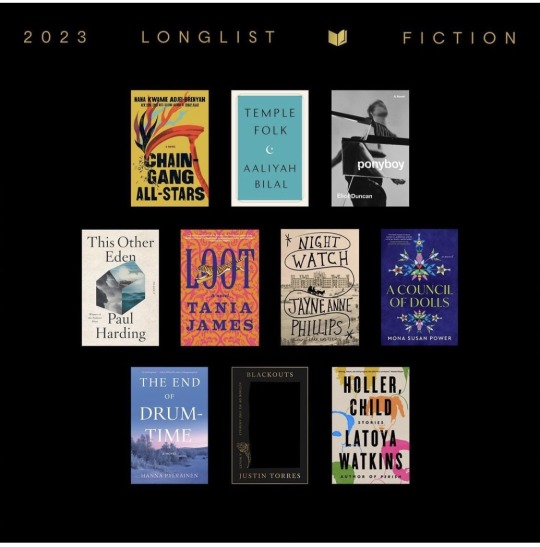
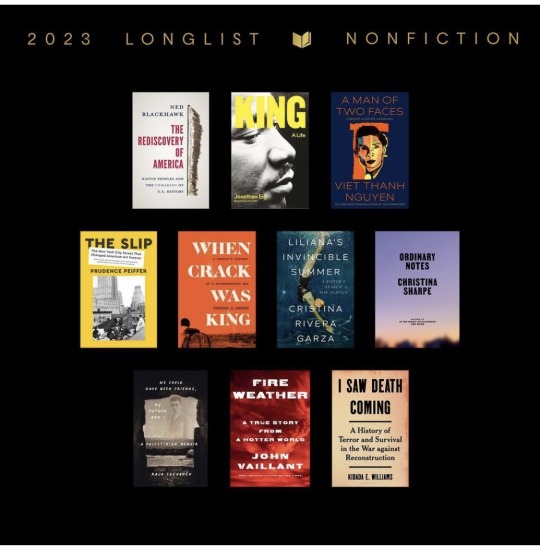
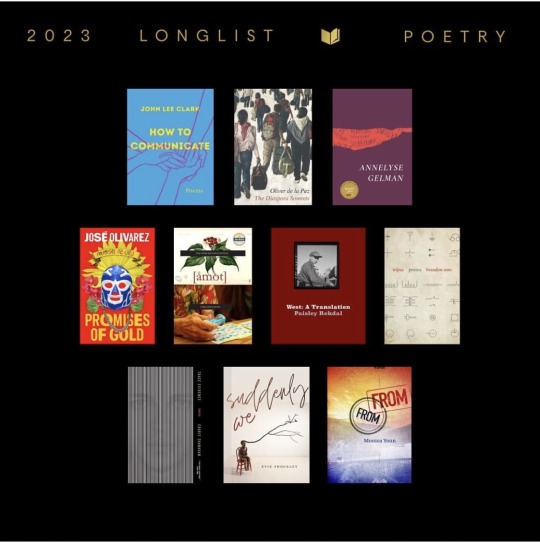
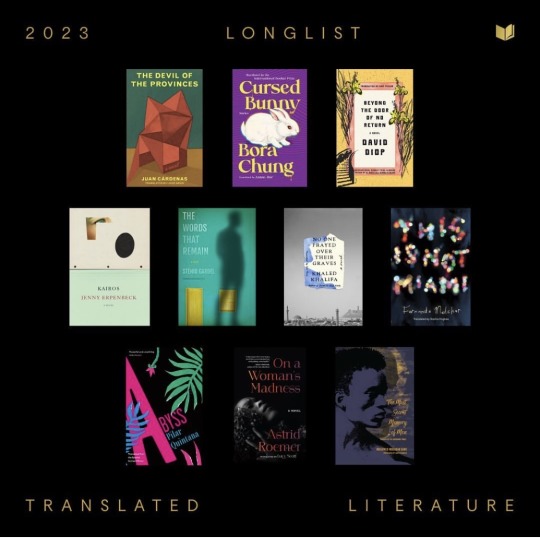

4 notes
·
View notes